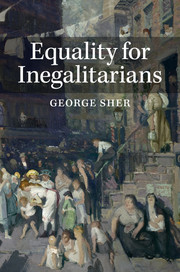Book contents
- Frontmatter
- Contents
- Preface
- Chapter 1 Reconciling equality and choice
- Chapter 2 Luck as the absence of control
- Chapter 3 Equality, responsibility, desert
- Chapter 4 The monistic turn
- Chapter 5 Why we are moral equals
- Chapter 6 Completing the turn
- Chapter 7 Coping with contingency
- Chapter 8 Enough is enough
- Chapter 9 From sufficiency to equality
- Bibliography
- Index
- References
Chapter 4 - The monistic turn
Published online by Cambridge University Press: 05 August 2014
- Frontmatter
- Contents
- Preface
- Chapter 1 Reconciling equality and choice
- Chapter 2 Luck as the absence of control
- Chapter 3 Equality, responsibility, desert
- Chapter 4 The monistic turn
- Chapter 5 Why we are moral equals
- Chapter 6 Completing the turn
- Chapter 7 Coping with contingency
- Chapter 8 Enough is enough
- Chapter 9 From sufficiency to equality
- Bibliography
- Index
- References
Summary
Might a single set of normative considerations tell both for the perpetuation of those inequalities that do reflect the parties’ choices and for the elimination of those that do not? By raising this question, we move into relatively unexplored territory; for although a great deal has been written about equality, the literature contains few self-consciously monistic defenses of luck egalitarianism. Indeed, the only two of which I know are an appeal to fairness that can be extracted from some brief remarks of Gerald Cohen's and the much lengthier appeal to the moral equality of persons that runs through Ronald Dworkin's Sovereign Virtue. Thus, after briefly considering Cohen's remarks, I will devote most of this chapter to a critical examination of Dworkin's position. My main conclusions will be, first, that the economic inequalities that Dworkin seeks to justify bear no real relation to the agents’ choices and, second, that his deeper conception of equality is too underdeveloped to support any particular distributive conclusions.
I
In her 2003 book Justice, Luck, and Knowledge, Susan Hurley wrote that we cannot legitimately infer, from the premise that unchosen inequalities are unjust, that what justice does require is the equal (or any other particular) distribution of the relevant goods. In resisting this inference, Hurley came close to maintaining that the two halves of luck egalitarianism cannot be traced to a single normative source. Thus, it is not surprising that when Gerald Cohen responded to her criticism in 2006, he did so by advancing what is, in effect, a sketch of a unified justification.
- Type
- Chapter
- Information
- Equality for Inegalitarians , pp. 54 - 73Publisher: Cambridge University PressPrint publication year: 2014

